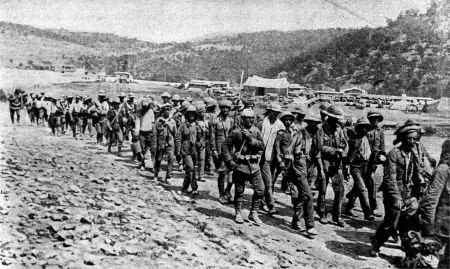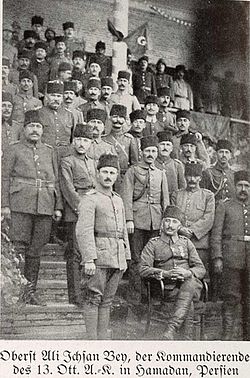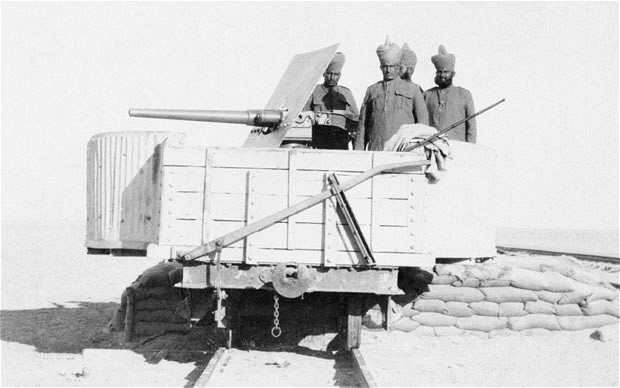British Turn Retreat into Advantage
With Sights on Baghdad, British Command Hesitates.
Special to The Great War Project
(28-31 August) The war in the Middle East is now focusing on Baghdad. It is a very complex picture.
Here’s what it looks like.
The British defense forces capitulate at Kut, on the Tigris River south of Baghdad in April 1916. It is a great victory for the Ottomans, and a terrible stinging loss for the British, the worst collapse in British military history.

British collapse at Kut, spring 1916
But almost immediately, the Ottomans face a threat to their position in Baghdad, which they occupy. At this point in the war, Baghdad is the ultimate goal for the British in Mesopotamia (now Iraq).
“Almost immediately after their victory in Kut,” writes historian Eugen Rogan, “the Ottomans faced the menace of a Russian attack on Baghdad.”
The Russians are coming from Iraq’s eastern border, the Persian border, and the force that is threatening to invade Mesopotamia is the Russian force in neighboring Persia.

Turks on campaign in Persia, summer 1916.
The Russians take several border towns between Persia and Mesopotamia.
The Russian seizure of these border towns puts them just a hundred miles from Baghdad.
Meanwhile, both the British and the Ottoman Turks take some time to rest and recover around Kut. The British consider the fall of Kut as defensive in nature.
The British command announces, disingenuously, “We do not attach any importance to the possession of Kut or to the occupation of Baghdad.” The Ottomans do not believe this obvious ploy.
The British commander in Mesopotamia “recommends that the British maintain as forward a position as can be made secure tactically,” writes Rogan, “to minimize the effect of the fall of Kut on Britain’s reputation and to force the Ottomans to retain troops on the Tigris that might otherwise be redeployed to confront the Russian column threatening Baghdad.”
The Ottomans recognize this “passive line” on the part of the British. So in the summer a century ago, the Turks use this as an opportunity to “throw everything they’ve got at the Russians” in the Persian border towns.
This brings important strategic shifts. “The Ottoman surge into Persia worried both the Russians and the British,” writes Rogan, “but it left the Ottoman defenses in Baghdad dangerously under strength.”
It is a colossal mistake on the Turks’ part, from which they never recover.
The British take steps to reinforce their Mesopotamia Units with troops from India and Egypt.
By the autumn of 1916, the British have “built up a formidable force in Mesopotamia, reports Rogan. More than 160,000 British troops are now deployed there.
As the British force grows, writes Rogan, the Turkish force contracts. “Worn down by illness, desertion, and casualties incurred in the regular exchanges of fire between Ottoman and British lines,” observes historian Rogan, the Turks suffer from a lack of reinforcements. British intelligence calculates that the Ottoman strength is no more than 20,000 troops. The actual figure is even smaller.

Indian troops with British in Mesopotamia, date and place uncertain.
The British are moving loads of equipment and ammunition to a beachhead they establish and can protect on the Tigris near Kut. They even build a light railway line to speed the delivery of ammunition and equipment.
The goal is clearly Baghdad, and now the British have the advantage.
Still the British hesitate. Despite these significant developments on the ground, the British War Committee in London acts with an extra abundance of caution. They hold back on authorizing an offensive aimed at Baghdad. “They believe Baghdad would be very difficult to take,” writes Rogan, “and even harder to hold.”
For the moment, the British command “dismissed the capture of Baghdad as of ‘no appreciable effect on the war.’”
But this is not the last word on the strategic importance of Baghdad and Mesopotamia.

Mike,
this is very helpful history for my research on my grandmother who was living in Baghdad. I need to find a war to search your blog for all references to the Iraq front. Do you know how I can do this?